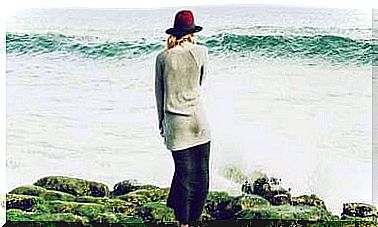5 “habits ” In People With Anxiety
There are parts of your personality that are not really: these are the attitudes or “habits” that arise and are maintained because of anxiety and which tend to mingle with your real personality. This mixture can be dangerous, make you seem strange or even rude, and can make your life more difficult when other people are judging you based on these actions but not really getting to know what’s going on in your head.
We suggest you analyze these habits below. Knowing them can help us better manage our anxiety and emotions, get the most out of ourselves, and reveal our true self.
“Fear sharpens the senses, anxiety paralyzes them.”
-Kurt Goldstein-
1. Spend your time apologizing
People who suffer from anxiety have the feeling of always bothering others or, on the contrary, of constantly having to satisfy them. So they spend their time apologizing. To apologize for everything, for nothing, at every moment. It seems like a habit that’s impossible to control.
The real embarrassment in other people comes from this habit which, like so many others, is bothersome and not healthy at all. It is embarrassing not knowing what to say to someone apologizing for unimportant things, or even for situations that have nothing to do with them.
2. Take it all personally
This habit is extremely linked to the one we have just seen. When you say or show something to people with anxiety, they think about it a lot. They can think about it for a whole day, at any time, and it ends up bothering a lot… when it was just an innocent comment. Nothing more.
This then leads to a vicious circle. This comment makes them nervous, anxious, and ruminating on it only helps fuel that anxiety. To scare away these thoughts, they may opt for a change in behavior and end up being grateful or apologizing. But it can make them feel silly and even more anxious.
“Concern does not eliminate the pain of tomorrow, it only makes the strength of today disappear”.
-Corrie ten Boom-
3. Giving up places or not ending conversations
Very often, anxiety can take over and generate, in people, a habit of avoidance or flight when they feel threatened or when a situation is beyond them. Another consequence of anxiety is that it pushes the person to close in on himself and on what produces him this anxiety, thus disconnecting completely from the rest of the stimuli of his entourage (a conversation, for example).
It’s not because these people don’t like company. In truth, anxiety takes over and the best solution they can find is to leave one place or think about something else, even if it projects the image of a poorly brought up person.
4. Daydream and think about the worst possible scenario
This is a very common habit. Even though, during certain moments of our lives or during certain situations, we have all considered the worst-case scenario, people who suffer from anxiety have a habit of overestimating the likelihood of the worst possible scenarios. . Constantly placing yourself in the “worst” can have physical and psychological consequences, lead to chronic fatigue and make relationships very difficult.
They believe that anticipating their future protects them and prevents them from feeling anxiety when the opposite is true: it leads to more fear, more uncertainty and reinforces this anxiety because people do not focus. only on the worst, get nothing, and this negative scenario very often ends up becoming real.
We can assess situations carefully, paying as much attention as possible, but we must remember that we cannot predict the future or know what is going to happen. Avoiding situations doesn’t protect us at all: it just prevents us from enjoying things, people and life.
“Each day has two handles: we can start it by grasping the handle of anxiety, or live it by taking the handle of faith”.
-Henry Ward Beecher-
5. Having trouble making decisions
People with anxiety tend to analyze situations in great detail, which makes it almost impossible for them to make a decision. Even if it is a simple decision or even if there is no right or wrong decision, such as deciding what clothes to wear or what to eat . This “habit” affects these people but can also affect them in their work, in their marriage or with their children.
Making decisions can make anyone anxious, we are all afraid of making mistakes, but the habit of over-analyzing things in the smallest detail and avoiding making decisions normally leads to even more anxiety. greater than that which is present when we decide. In the latter case, tell yourself that you could be wrong but that you can also correct this error.
We cannot escape the decisions we face, let alone delegate them. Deciding is a daily act whose result will come from different variables. We do not control them all (think luck) but we can influence some like attitude: we must then concentrate all our strength on them.
Bad habits create and fuel anxiety
Through this article, we wanted to show you that sometimes bad habits of people with anxiety can cause them even more anxiety. So, while knowing situations well is the first step in being able to avoid them, it can be very helpful to speak openly about this anxiety when it assails us so that others can help us.
Another important element in dealing with these situations and habits is that it is not necessary to face them in solitude. Anxious people, like many other people, believe that no one can help them with their problems or have difficulty asking for help. But they are very far from reality: By sharing our feelings, we prevent others from forming the wrong opinions about what is happening to us and we allow them to understand our emotional state.








